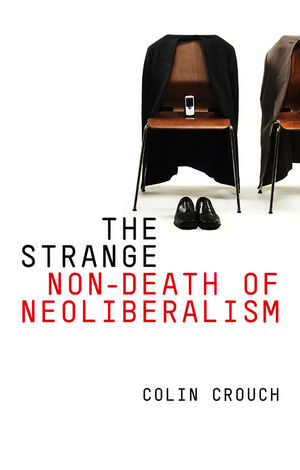The Strange Non-death of Neo-liberalismISBN: 978-0-7456-5221-4
Paperback
224 pages
August 2011, Polity
 |
||||||
The Guardian
"This highly accessible book makes its case persuasively."
Times Higher Education
"a valuable book that not only gives a very good overview of
neo-liberalism and its failings, but also points to government
errors and serves as a good primer in such things as imperfect
information in markets."
Irish Journal of Sociology
"A rich and powerful book. It pushes towards an analysis
of neoliberalism not as the set of liberalizing forces that it
depicts itself as being, but rather as a grouping of impulses that
have both hampered government and weakened market
competition."
Crooked Timber
"An excellent contribution to the study of political economy
that directly resolves the puzzle it has identified."
Transfer: European Review of Labour and
Research
"A well-reasoned and tightly argued analysis of our present
predicament. Although written for the intelligent general reader,
rather than subject specialists, his insights constantly provoke
and illuminate. Far from being merely a dry dissection of
neoliberal theory, the book also addresses how to make corporations
behave better."
LSE Politics Blog
"Takes forward and moves beyond Karl Polanyi’s (1957)
analysis of state/market relationsto match the changing conditions
of the twenty-first century."
Journal of Contemporary European Studies
"The most important work on the political economy of modern
capitalism since Keynes, Kalecki and Schonfield."
Philippe C. Schmitter, European University Institute
"Colin Crouch shows how neoliberalism as embodied in large
corporations brought about the Great Recession of 2007 and yet,
ironically, they profited in wealth and power from it - at everyone
else's expense. A compelling read."
Michael Mann, University of California, Los Angeles
"An excellent contribution to the debate about neoliberalism.
Crouch gives us a tightly reasoned and well balanced critique of
the neoliberal philosophy that contributed significantly to the
2008 financial crisis. And his call for a more frank discussion in
civil society of the moral and ethical assumptions behind
neoliberalism is a refreshing addition to the traditional call for
simply bringing the state back in to tame market forces."
John L. Campbell, Dartmouth College



